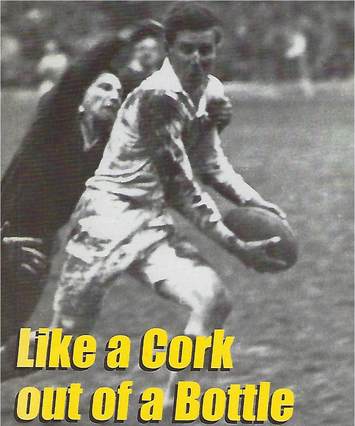The story of Columba is one of the great stories of British history. Columba brilliantly combined the political and the spiritual.
The Bible is full of stories of people who got into deep trouble - Moses, David and Paul, for instance - who then repented, recovered and gave outstanding leadership. God gave them a second chance, a second touch, and the world has been renewed by them.
Columba continues that great line.
He had all the gifts - horseman, sportsman, boatman, poet, musician (with a glorious singing voice) - and with his princely background he was surely destined to be High King of Ireland.
But he had one weakness. He was a violent man, of hot blood, and at one point his temper was so hot that it led to a Druid-Christian confrontation. Three thousand were killed in the battle of Culdremne, in Sligo. The Christian forces won, but for this violence, Columba's fellow monks threatened him with excommunication. But they relented, saying, 'We could not cast out the one whom God has chosen to lead the nations into life.' As a penance he accepted exile from Ireland and a calling to win 3000 souls for Christ, to atone for the dead of the battle.
Columba was then 40, and he accepted his second chance. He sailed for Iona with twelve companions and so the Golden Age of Ireland, which began with Patrick, continued.
The story of Columba is a great favourite of my wife, Juliet, and myself. A Scottish friend sent Juliet a book about Columba's life, suggesting it might contain material for a play. Indeed it did. Here was high drama, and a story that deserved to be told and retold - giving a picture of the real Ireland that gave faith to Europe.
Juliet and a friend, Joanna Sciortino, set to work on producing a script. After much research, including visits to the Bodleian Library in Oxford, the play came to birth - and went around Britain for two years with 133 performances in six different productions - from the Orkneys to London - starting at the Edinburgh Fringe in 1978.
In the introduction to the play, Juliet and Joanna wrote: 'Columba and his monks made Ireland literate. From Iona and other monasteries they bound together the wandering tribes of Scotland with a common faith, and started to Christianise the North of England. In the years ahead the Irish saints and scholars were to become the intellectual leaders of Europe. Their schools sent out the "Peregrini", bringing culture and faith to a continent disintegrating in barbarism.'
Columba prayed for 'purity, wisdom and prophecy'. His prayers were surely answered. This then is the story of what one person can do. He could have easily turned back at the age of 40.
C S Lewis in Mere Christianity wrote this: 'We say, "I never expected to be a saint. I only wanted to be a decent ordinary chap", and we imagine we are being humble. But this is the fatal mistake. To shrink back from God's plan is not humility, it is laziness and cowardice. To submit to it is not conceit but obedience.'
Columba did not shrink or turn back.
English


